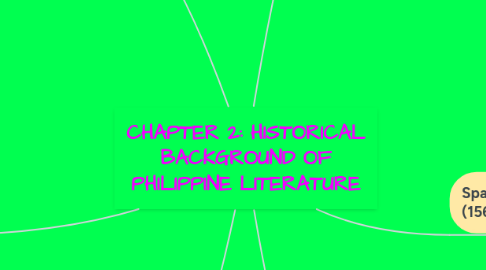
1. Contemporary/Modern Period (1960-Present)
1.1. Repressed Martial Law
1.2. Curtailed Human Rights
1.3. Freedom of the Press
1.4. Theater as vehicle for protest
1.4.1. Philippine Educational Theater Association (PETA)
1.4.2. UP Theater
1.5. Writers continue to show dynamism and innovation
2. American Colonial Period (1910-1945)
2.1. Amateurish and Mushy Poem
2.2. English language became medium of writing
2.3. Sarsuwela replaced by Drama
2.4. Women enhanced their talents
2.5. Literary Forms
2.5.1. A. Short Stories
2.5.2. B. Novels
2.6. Period of Emergence(1920-1930)
2.6.1. Jose Garcia Villa- Poet of the Century
3. Japanese Occupation (1942-1960)
3.1. War Years (1942-1944)
3.2. Wrote simple language and free verse
3.3. Fiction prevailed over poetry
3.4. A. Compilation of short story (1943)
3.4.1. i.Suyuan sa Tubigan- Macario Pineda
3.4.2. ii. Lupang Tinubuan- Narciso Reyes
3.4.3. iii. Uhaw ang Tigang na Lupa- Liwayway Arceo
3.5. B. Period of Maturity and Originality (1945)
3.5.1. Bountiful harvest in poetry, fiction, drama and essay
3.5.2. Writers mastered English language
3.5.3. Literary "giants" appeared
3.5.4. Palanca Awards for Literature
3.5.4.1. Jose Garcia Villa
3.5.4.2. Nick Juaquin
3.5.4.3. NVM Gonzales
3.5.4.4. Bienvenido Santos
3.5.4.5. Gregorio Brillantes
3.5.4.6. Gilda Cordero Fernando
3.5.5. National Artist Award
3.5.5.1. Jose Garcia Villa
3.5.5.2. Nick Juaquin
4. Pre-Colonial Period (--BC to 1564)
4.1. Oral traditions
4.2. Ideology and Phraseology
4.3. Reflecting daily life activities
4.4. Literary Forms
4.4.1. 1. Oral Literature
4.4.1.1. A. Riddles
4.4.1.2. B. Proverbs
4.4.1.3. Tanaga
4.4.2. 2. Folk Songs
4.4.2.1. A. Hele
4.4.2.2. B. Ambahan (Mangyan)
4.4.2.3. C. Kalusan (Ivatan)
4.4.2.4. D. Tagay (Cebuano)
4.4.2.5. E. Kanogan
4.4.3. 3. Folk Tales
4.4.3.1. A. Myths
4.4.3.2. B. Legends
4.4.3.3. C. Fables
4.4.3.4. D. Fantastic Stories
4.4.4. 4. Epics
4.4.4.1. A. Lam-Ang
4.4.4.2. B. Hinalawod
4.4.4.3. C. Kudaman
4.4.4.4. D. Darangen
5. Nationalistic/Propaganda and Revolutionary Period(1864-1896)
5.1. Spanish to Tagalog
5.2. Intelligentisa
5.3. Literary Forms
5.3.1. 1. Propaganda Literature
5.3.1.1. A. Political Essays
5.3.1.1.1. i. Dairiong Tagalog
5.3.1.1.2. ii. La Solidaridad
5.3.1.2. B. Political Novels
5.3.1.2.1. i. Noli Me Tangere
5.3.1.2.2. ii. El Felibusterismo
5.3.2. 2. Revolutionary Literature
5.3.2.1. A. Political Essays
5.3.2.2. B. Kalayaan
5.3.2.3. C. Poetry
6. Spanish Colonization Period (1565-1893)
6.1. Religious and Secular
6.2. Medium of Communication
6.3. Alibata
6.4. Christian Folk-Tale
6.5. Literary Forms
6.5.1. 1. Religious Literature
6.5.1.1. A. Pasion
6.5.1.1.1. Long narrative poem
6.5.1.2. B. Senakulo
6.5.1.2.1. Dramatization
6.5.2. 2. Secular(non-religious)Literature
6.5.2.1. A. Awit
6.5.2.1.1. Singing and Chanting
6.5.2.2. B. Korido
6.5.2.2.1. Metrical Tale
6.5.2.3. C. Prose Narratives
6.5.2.3.1. i. Dialogo
6.5.2.3.2. ii. Ejemplo
6.5.2.3.3. iii. Manual de Urbanidad
6.5.2.3.4. iv. Tratado
